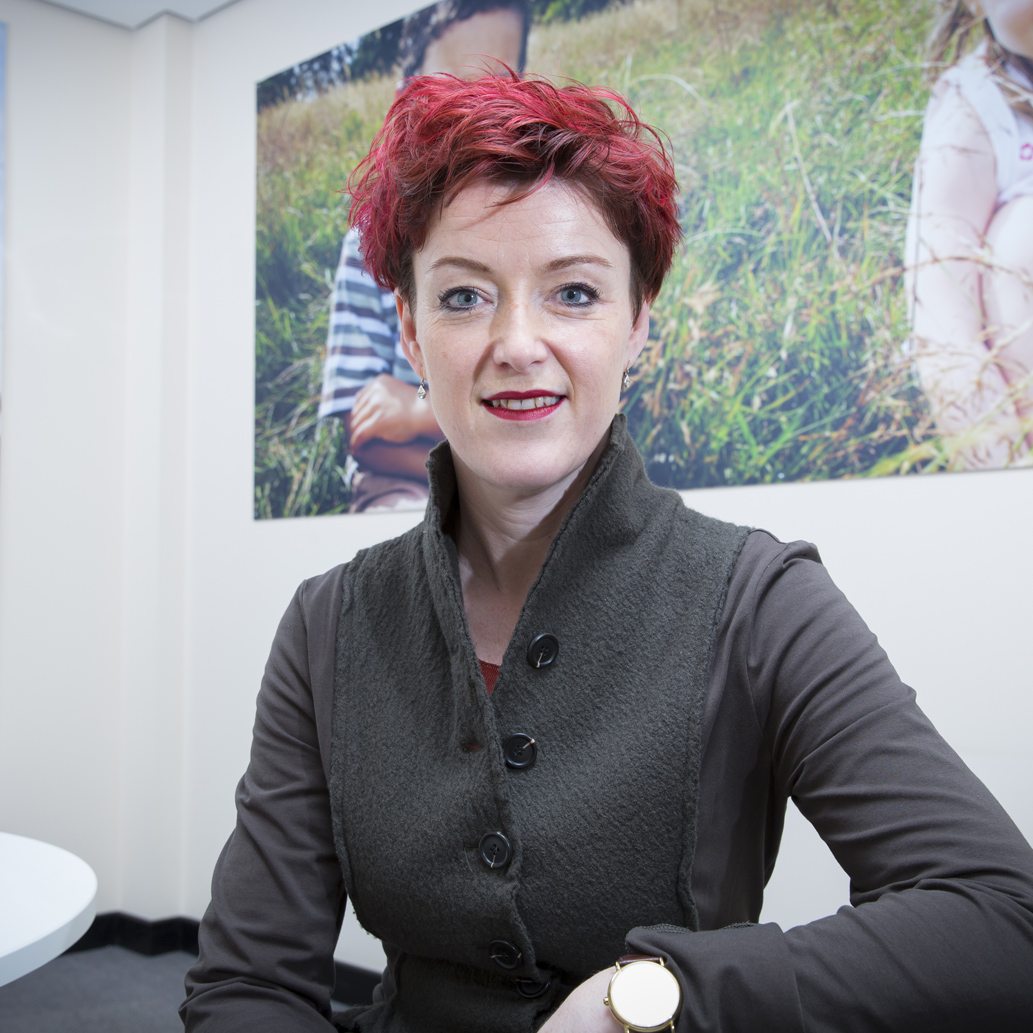
I left school at 16 and was brought up in Lincolnshire and like a lot of young people are finding these days, I realised I couldn’t afford to go to university. So I joined my local NatWest branch. I guess my first brush with HR started in my second week, when the next new girl joined and I was asked to train her to do what I had been doing! I worked in branch banking for about seven years, and I got more involved with training new recruits, and I really enjoyed helping people to learn and improve their confidence. So when the area trainers visited the branch, I pestered them to tell me how to get a role in HR. Eventually, I got an interview for a regional Learning & Development role in NatWest and then moved into more generalist roles after that.

Yes and I remember having the distinct impression when I joined the bank that HR was the head of “establishment”. But as you say, my time there was right in the centre of a whole lot of change in banking, where it was going from bricks and mortar, nine-to-five opening hours, the old-world image of the bank manager opening up, cashing up and closing, into a world of technology and 24/seven service. HR needed to support a lot of that change, getting the workforce on board with new technology, and a whole lot of new ways of working. Workforce planning was changing immeasurably and was central to the piece, with a strong focus on delivering learning & development. Banking was changing significantly, as was customer expectation, and the centralisation of operational delivery elements, such as call centres, was the big game changer for banking, for both corporate and personal customers. For sure, this was a massive undertaking, but was really exciting, big transitional stuff. Increasingly, I found myself drawn towards learning & development, including the massive programme of training contact centre staff, plus we were developing a new culture in the working environment that was more fitting to the new way of operating, with more shift work and flexible working.

In my experience, the businesses I was working for were very focused on providing improved customer service with really positive intentions. I think what happened had little to do with people working in branches and call centres, who were very well trained in customer service and following guidelines. It’s been well documented, the hows’ and whys’, and I’m not the best person to comment on that. But as an observer, and someone that has a responsibility for corporate and personal conduct, yes I think a lot of lessons have been learnt, and it would be really useful for all to see why some financial institutions didn’t end up going down the wrong routes and managed to show good conduct, whilst their competitors did not.

Capital One originally entered the UK on the premise of “changing the market for the good of the consumer”. It was a fast moving, innovative, “different” organisation and I suppose I was ready for a change. They had deliberately targeted staff in places like ours and had an approach of asking their staff to recommend potential new employees, and I was lucky enough to be recommended by some people that I had worked with at NatWest and was approached to take on a role in the learning function. It was an exciting time as Capital One was expanding its European businesses and so the role involved a fair degree of travel and the opportunity to work with different countries and cultures.
You know, it’s a much more transparent world today. Some big and far reaching questions are being asked about business organisations, the media, the political world, even religious institutions, and all have proved themselves capable of poor behaviour. Obviously, where wrong-doing is proved, those responsible need to be dealt with appropriately. Lessons need to be learnt, which should be used positively, to provoke us to think about how we should be managing organisations, as a part of society at large, as opposed to separate entities with profit-at-all-cost mantras. I think that really has sunk in, both in terms of how we look at leadership and what we expect from our leaders. There is a palpable change in values and ethics in leadership. Do I think there hasn’t been a focus on that in the past? Not entirely, I think organisations have been focusing on values in leadership for quite some time. What hasn’t been given so much attention is the systemic nature of how to embed those values. One of the big lessons learnt is giving people the platform and confidence when they experience wrong doing in their organisation, to report it. Since joining NSPCC, I realise even more, of course, how important that is. Things can go tragically wrong if concerns are not raised or decisive action isn’t taken to protect a child.
I was approached for the position of HR Director at DEFRA, its focus is on environmental issues such as; climate change, farming and rural communities, so this really caught my interest, as I had grown up in the countryside. A significant focus was climate change at the time, and they were looking to introduce a more private sector approach, so for me it was a case of right time, right place. What I immediately came to understand was the UK Civil Service is responsible for such a wide and complex variety of work, from counterterrorism to milk yields, and we were dealing with huge problems with no easy solutions. Working in the public sector placed a very different emphasis on the skills and competencies that I needed to develop. In terms of the differences of working for DEFRA, the pace of it – issues like climate change are ones where you might not see any discernable difference in an entire career. So the focus sometimes needs to be on taking the agenda in the right direction rather than delivering major changes. On the other hand, if you look at how DEFRA responds to crisis like flooding or animal disease outbreaks, it’s a rapid response, bristling with expertise and knowledge, with great discipline and planning.
Yes, what a fabulous opportunity to have been offered. At the time, Job Centre Plus was a separate agency with about 78 thousand staff. It was the beginning of the period of planning for the move to Universal Credit, probably the biggest change to the welfare state since its establishment. The workforce planning issues were enormous, especially given the ever-tightening public sector purse strings. And the challenge of engaging staff in such immense change was also significant. I am particularly happy with the work that we did to develop leadership at all levels in the organisation. It was, I think, a significant factor in managing to drive a steady and significant improvement in engagement levels over a period of such instability and change. The Civil Service is actually a fabulous place to develop a career in HR, full of opportunities, and whilst I was there, I was a member of the cross Government leadership group for the Civil Service, and sat on the People Board of the Home Office, which was involved in the development of mentoring in the MOD. The opportunity to work with such a wide and varied range of organisations is not one that I think you will find anywhere else. It was also a time when the civil service was going through next-generation HR, being more centralised in places that made sense, and making sure it was sharing best practice and expertise. This in itself was a huge change for the HR community in the Civil Service, and obviously, it was a fantastic opportunity for me to be involved in such a big transformation program.
NSPCC is a national institution, and it is a beacon of light for victims in a very bleak place. It has the highest credentials and public respect for consistently doing the right thing, and it is there to protect the most vulnerable members of society, children. My interest in the Charity Sector developed in part through my own volunteering work. I have had the privilege of volunteering for Crisis at Christmas for the last five years, getting involved in some fascinating and rewarding voluntary projects and I found the whole experience of volunteering fascinating and truly enriching. The concept of a very different kind of workforce’ and the challenges of managing and developing volunteers became really fascinating for me. I think there is a lot that the worlds of HR and Volunteer Management can learn from each other. So when I found out that the role of HR Director at NSPCC was available, I applied without hesitation and was fortunate enough to get the job. One of the most challenging pieces of the interview process was an interview with a panel of young people and that was really daunting and challenging – partly because of the offside questioning – but also because I know that the NSPCC takes the feedback from these panels very seriously. It gave me a clear idea of how the organisation thinks and works, and the importance it places on listening to children and young people in the development of services, campaigns and overall direction.
There had been a lot of heavy lifting done by my predecessor to get the operation up to speed, from a human resources perspective. The first key objective was to move HR from being an HR function to a “People” function. Delivery of what we do at NSPCC is supported by the more than 11,000 volunteers that operate ChildLine, our schools service, fundraising, all of which would not work without volunteers. We are currently looking for more volunteers for the Schools Service, as we fundraise to roll it out across the country, so that every school gets a visit every two years. Because more children are contacting ChildLine online, we also need more volunteers to deal with this and the increased levels of demand. So my team and I are not just providing HR services to salaried people, there is also a diverse range of volunteers carrying out a wide myriad of tasks in many different roles. We wanted to create a sense of a single family, delivering to a really critical goal; ending cruelty to children. And in bringing this family culture, the differences became positives. The salaried staff are truly inspired by the spirit of volunteers and the chief similarity, that everyone is trying to do the best job possible, came to the fore, and that has really propelled us forward.
In the NSPCC, not surprisingly, our Values are a significant part of what we look for when we are recruiting staff and volunteers to the organisation. It is absolutely critical for us that people really understand the challenges of protecting and safeguarding children. Our people face challenging and difficult situations every day and so we also need to ensure that the people we recruit are experts in their field and resilient to what they will face. That means too that we focus on ensuring that our managers and leaders are really focused on the supervision and support of their teams. It places a really high premium on the role of management in the organisation, as it is so critical for us to support our people well.
NSPCC is a large and complex organisation with a high degree of risk as a result of the services that we operate and the level of risk involved in doing what we do. That provides a massive challenge to the way that we operate. We concentrate on three key areas; protecting children who are being abused or neglected right now, through services such as ChildLine and the Helpline. The NSPCC also has over 40 service centers across the UK where we work face-to-face with children, young people and families who need our help; preventing abuse in the future through things like our awareness-raising Schools Service. Our volunteers go in to speak to children in primary schools about the subject of abuse and how to get help, and it’s about transforming societal views and approaches to abuse through things such as campaigning for young witnesses to be handled differently by the court system. We also need to raise funding every year to enable us to continue to do the work that we do. We do not receive significant levels of Government funding, approximately 90 percent of our funding comes from individual donors.
Indeed, this has been a deeply disturbing period with high profile events such as the Savile inquiry, driving levels of public awareness to new levels. With this has come a massively increased demand for services like our helplines and we are constantly seeking to deal with those demands. Of course, for all its advantages, the Internet and mobile communication is a huge and difficult problem in the fight against abuse. Abuse has always been there, but it is true that young people are growing up in a very different world than we did. Bullying existed when I was at school, but when children walked out of school, the bullying stopped. Now, because of social media, it potentially never stops. We need to adapt to this by helping children to cope with the world in which they are living. One example of this would be the ZipIt Application that we have launched recently, designed in conjunction with young people to help them to deal with the challenges of sexting. It’s important for readers to bear in mind that our staff are not the only people that see and can act upon issues of child abuse. One of the approaches we are involved in is working with HR teams in other organisations on how they can support their employees in situations in which they may have a concern for a child. For example, some employees visit customers at home, and that can lead to them having concerns for the wellbeing of a child. Through our Adult Helpline, anyone can report concerns of that nature and know that their concerns will be investigated appropriately.
My dad gave me a piece of advice. I was thinking about a decision I had made, and wondering whether I had made the right decision or not, and he said: “You will always make the right decision in life, because you will never know what would have happened if you had taken the other option”. Not very scientific I grant you, but there’s an element of truth in it. So I am happy with the decisions that I have taken and the experiences that I have had as a result. I am particularly happy to have worked in a range of sectors and, as I said earlier, I truly hope that the different sectors can learn to be much more respectful of each other, their strengths, capabilities, endeavours and achievements.
Fundamentally, I believe the majority of people get out of bed and go to work wanting to do a good job, and that’s a pretty useful foundation on which to work on. It’s a natural instinct for people to want to have meaningful lives. We spend a significant portion of our lives at work, it’s important that we feel fulfilled by it. What I have learnt about organisations is, we can be good at making that difficult for people in a myriad of ways. So I think the challenge that organisations have is to try and make work as meaningful as possible for people. Fortunately at the NPSCC that isn’t difficult.
University of Oxford – Nuffield Department of MedicineSalary: £27,838 to £31,459 per annum (pro rata). This is inclusive of a pensionable Oxford University Weighting of
JOB TITLE: Hotel Manager – FTC 12 months – January 2025 start LOCATION; North West England SALARY: Around £45,000 per year plus performance-based bonus, rewards,
We are seeking a dynamic and driven Human Resources Officer to become a key player in The Welbeck Team In this exciting role, you’ll invent